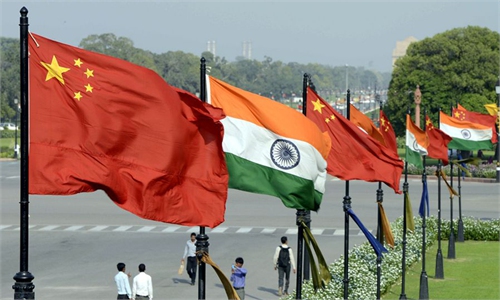COMMENTS / EXPERT ASSESSMENT
India should show more sincerity to promote trade with China

Illustration: Tang Tengfei/Global Times
While India's unreasonable and unrealistic demands during the latest round of corps commander-level talks with China had created new challenges for bilateral ties, India is still showing a willingness to improve economic and trade ties with China. The deepening of economic cooperation between the two major Asian economies can indeed become a stabilizer for bilateral relations. What India now needs to show is its sincerity in repairing trade relations with China.Under the impact of India's continued anti-China policy, current China-India economic and trade relations are already in deep trouble. Driven by the irrational hostility of anti-China forces in New Delhi, India launched a comprehensive campaign to eliminate Chinese influence in its economy.
India has repeatedly blocked Chinese companies from participating in the bidding of Indian government projects, conducted government reviews of Chinese investment, and banned nearly 300 Chinese apps. Indian state-owned telecommunications companies refuse to use Huawei equipment for network upgrades, and the Indian government refuses Chinese companies to participate in 5G trials.
On the trade front, the China-India trade dispute has existed for many years; India has been seeking to reduce its trade deficit with China. India has imposed anti-dumping duties on a variety of Chinese products, and listed Chinese home appliances like color TVs and air-conditioners as prohibited imports.
After the Trump administration flagrantly launched a trade war against China, India also moved to increase its suppression and discriminatory policies against Chinese companies and products. Some Indian politicians believe that the China-US trade war will inevitably lead to the shift of the global industrial chain and supply chain, and therefore actively lobby some multinational companies to transfer their production bases in China to India. Since the outbreak of the COVID-19 pandemic, many in India believed that a rare opportunity to push "Make in India" has come, and exacerbated the crowding out of Chinese companies.
India's arbitrary moves against Chinese businesses and products have severely ruined its business environment and hammered the confidence of Chinese companies. Yet its campaign to eliminate the Chinese factor from its economy has demonstrably failed. The stable performance of China-India trade even under the artificial adversity created by India has largely exceeded the expectation of Indian anti-China forces.
India's dependence on China's trade is very large. Over the past year, India's economic dependence on China, far from falling, has actually risen. With a bilateral trade of $86.4 billion in fiscal 2021, Chinese mainland has emerged as India's largest trading partner, overtaking the US in the process and registering 5.53 percent growth, according to India's official data.
Actively repairing economic and trade relations with China and promoting further growth of bilateral trade are obviously beneficial to India. The economic structures of China and India are complementary, but they are still not fully reflected in bilateral economic cooperation, and there is still room for further expansion in cooperation. Better trade ties with China will help India achieve its goal of being a major manufacturing country and help its economy recover from the pandemic as soon as possible.
The imbalance of China-India trade needs to be alleviated in the expansion of bilateral trade and mutual investment and through regional multilateral mechanisms such as BRICS and the Regional Comprehensive Economic Partnership (RCEP). What India urgently needs to do now is to stop and withdraw its discriminatory measures against Chinese companies and products.
The author is director of the research department of the National Strategy Institute at Tsinghua University. bizopinion@globaltimes.com.cn



